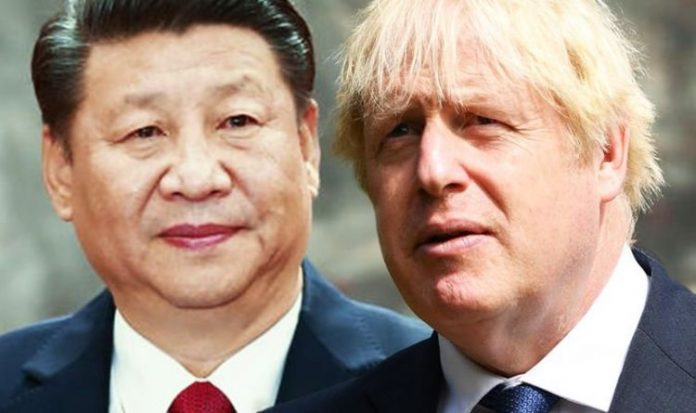China has in recent years found itself enjoying influence never before experienced abroad. The rise of social media and the importance of digital media have allowed Beijing to cash-in on its online expertise. This has been especially salient with platforms such as TikTok, which many countries now, including the US, are moving to ban.
US President Donald Trump in particular accuses China of harvesting American user data – potentially putting national security at risk.
Mr Trump has given Bytedance, Tiktok’s China-based owner, 90 days to find an American buyer should it wish to continue operating in the US.
India has already banned the social media platform.
Meanwhile, China enjoys a growing influence elsewhere in the world, including the UK.

China influence: Beijing is able to ‘groom” countries like the UK through embassies and consulates (Image: GETTY)

Boris Johnson: The PM has recently upped his rhetoric against China and its various malpractices (Image: GETTY)
Here, as well as in other countries, Sean King, senior vice-president of Park Strategies in New York and an affiliated scholar at University of Notre Dame’s Liu Institute, told Express.co.uk how through embassies and consulates, Beijing charms and “grooms” its host country.
He said that while China “doesn’t want world domination”, it does want to influence the way people view it from the inside out.
He explained: “They want to control their immediate area.
“You see this through economic coercion, threats, withholding of exports, contracts, tourists, and you see this through various state media posts around the world and the way embassies and consulates influence local discussion about China.
JUST IN: China announces plans for manned Moon base ESA Roscosmos NASA

48 Group Club: The club contains many high-profile names and members of Parliament (Image: GETTY)
“China isn’t hell bent on world domination but I definitely think they want to control their immediate vicinity and shape and control how people talk about them in all corners of the world.”
Earlier this year, the book Hidden Hand – an expose of Chinese influence networks – claimed that such influence through embassies and consulates was being channelled through the UK’s 48 Group Club.
The book suggested Beijing’s influence in Britain through the Chinese Communist Party is far-reaching and unstoppable.
Stephen Perry, the London businessman who chairs the 48 Group Club, has since launched legal action in an attempt to stop the book being published in the UK and Canada.
DON’T MISS
China cover-up: Brutal treatment of expert who tried to tell the TRUTH [INSIGHT]
North Korea chaos: Panicked Kim Jong-un deploys 1,500 special forces [REPORT]
Archaeology: Discovery of ‘blue monster’ in 1,400-year-old tomb [ANALYSIS]

Xi Jinping: China’s president pictured with the Group’s chairman (Image: GETTY)

China influence: Xi holds both considerable economic and digital influence across the globe (Image: GETTY)
The 48 Group Club, made up of around 500 members, is located in London and keeps a low profile as a political and business networking hub.
The book claims it is this networking “through which Beijing grooms Britain’s elites”.
Former deputy prime minister Lord Heseltine is a founding member and has previously said the group acts as a support network for those involved with trade in China.
Yet, Hidden Hand says a meeting between Mr Perry and President Xi reveals the significance of the club in China’s efforts to exert influence in the UK.

South China Sea: China holds a fair amount of control over the disputed waterway (Image: Express Newspapers)
According to The Times, at their meeting, Mr Perry praised Xi’s vision “of a community with a shared future for humanity”.
He was the only Briton among ten foreigners awarded the China Reform and Friendship Medal in 2018 to mark the 40th anniversary of the economic reforms, according to the state-controlled China Daily newspaper.
The newspaper said that Mr Perry, at an awards ceremony at the Chinese embassy in London in 2019, “China is already enormously influential in the world, but I think there’s much, much more to come.”
Mayfair art galleries have been among the venues where, according to the Daily Mail, the “Who’s Who of China’s big companies” would network with the 48 Club.

Belt and Road: China has extended its influence into Africa and Central Asia through infrastructure (Image: GETTY)
Following the publication of the Hidden Hand, the 48 Group took down its website.
But an archived version of the site from December revealed how current and former MPs, peers, chief executives, and prominent individuals from academia and media as “fellows”.







